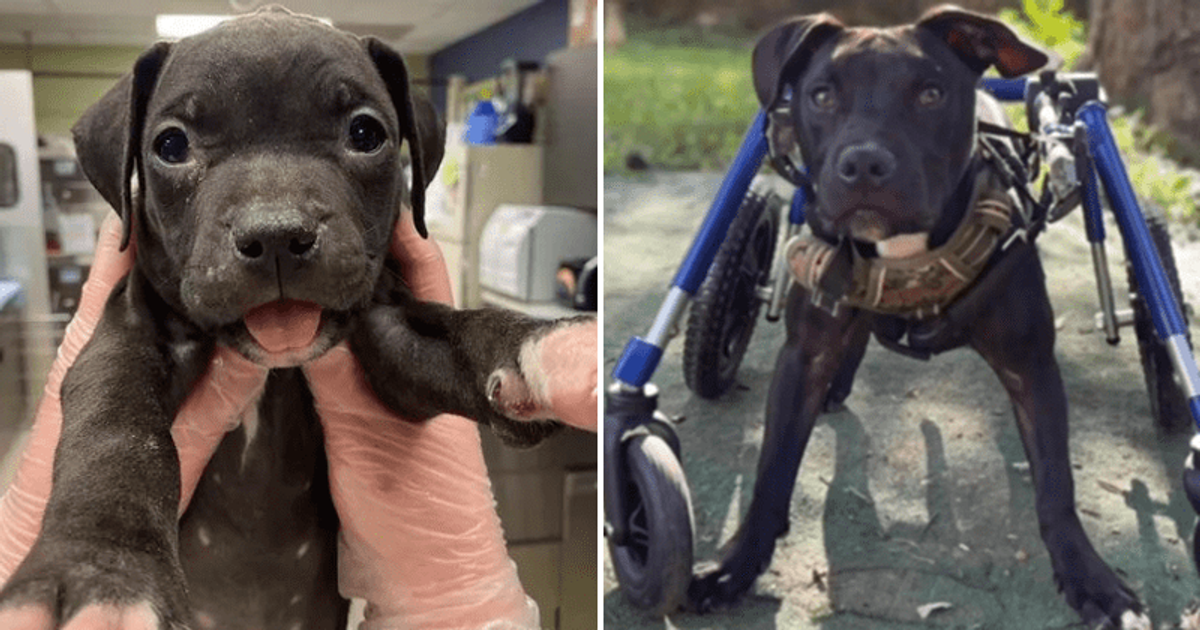Sit Down Dog Wheelchairs

Treating Dog Pneumonia: Symptoms and Causes
Dogs can be diagnosed with pneumonia. Just like in humans, pneumonia can be dangerous for a dog. Luckily, canine pneumonia is treatable and with proper care and attention dogs can make a full recovery.
What is Canine Pneumonia?
Pneumonia is an inflammation in a dog’s lungs and lower respiratory tract caused by infection or irritation. Although there are three different types of pneumonia, the most common form of canine pneumonia is bacterial pneumonia.
Understanding the three different kinds of pneumonia in dogs is key to getting your dog proper care. Here are the three types of canine pneumonia:
- Bacterial pneumonia - inflammation of the lungs and lower respiratory tract caused by a bacterial infection.
- Aspiration pneumonia - a form of bacterial lung infection caused by inhaling food or vomit into the lungs, most common with flat-faced dog breeds such as Pugs or Boston Terriers. Dogs with aspiration pneumonia are likely to vomit and struggle to swallow when eating.
- Fungal pneumonia - occurs when a dog inhales fungal spores from the dirt which cause inflammation and irritation in the lungs. This is the most difficult type of pneumonia to treat and symptoms can linger for up to six months.
When left untreated, pneumonia is dangerous and can be fatal. Dogs showing signs of pneumonia need to be examined by their vet for proper diagnosis.
How Do Dogs Get Pneumonia?
Pneumonia is considered a secondary infection, meaning the pneumonia was caused by a previous respiratory illness that has spread the bacterial infection to the dog's lungs. Bordetella, influenza, and kennel cough are common respiratory bacteria that cause pneumonia in dogs. Immunocompromised dogs are considered high risk for developing pneumonia. This includes dog with metabolic diseases or compromised immune systems. Regular exposure to a poor environment such as smog or exposure to smoke can also compromise a dog’s lungs and make them more likely to get pneumonia.

Understanding the Signs and Symptoms of Pneumonia
The signs of canine pneumonia are similar to those of pneumonia in humans. The telltale signs a dog has pneumonia includes:
- High fever
- Difficulty breathing and labored breathing
- Wheezing or nasal whistling
- Dog is lethargic or becomes easily tired
- Cough
- Heavy, loud, or shallow breathing
- Change in breathing pattern, such as rapid breathing
- Dehydration and loss of appetite
A pet can experience similar symptoms for many different health conditions. If your dog is showing signs of respiratory distress or any other signs of pneumonia it’s time to visit your veterinarian for examination and treatment. Call your vet before arriving to let them know your dog may have a respiratory condition. Most likely your vet will direct you into an exam room immediately to isolate and avoid the infection spreading to other dogs in the office.
How to Care for a Dog with Pneumonia
Recovery from bacterial pneumonia can take time. Your dog’s pneumonia can last a few days or several weeks. Getting your dog healthy again will require patience and regular care. Throughout recovery from pneumonia expect to make multiple veterinary visits for follow-up exams, additional scans and testing to check on your dog's progress and treat your dog's pneumonia.
Give Your Dog All Antibiotics Provided
Pets with bacterial pneumonia will be prescribed antibiotic medication. Since underlying infections can vary based on the particular bacterial strain infecting your pet, so will their treatment. A simple culture swap test confirms the diagnosis and determines how the bacterial infection will be treated.
Since culture lab results can take some time, it's likely the veterinarian will prescribe a broad-spectrum antibiotic for immediate treatment. Once culture results are available, it's possible that your dog will be switched to a different antibiotic to target the specific bacteria. Do not skip a scheduled antibiotic and make sure that your dog completes their round of antibiotics. Missing a dose or stopping treatment early can put your dog at risk for further complications or not fully treating their pneumonia. Additional medications can be prescribed to improve breathing, such as bronchodilators and expectorants for dogs.
Treating Dehydration and Loss of Appetite
Additional veterinary care will be needed for dogs that are extremely dehydrated or are malnourished. In these severe pneumonia cases, hospitalized dogs will receive IV fluids, medications, and oxygen therapy to help rebuild their strength. Once home, make sure your pet gets plenty of water to keep them hydrated and gets plenty of rest.
At Home Treatments for Pneumonia in Dogs
Once released from the hospital, at home care of your dog’s pneumonia may begin. At home pneumonia care goes beyond giving your dog medications, allowing for lots of rest, and proper nourishment. Pneumonia can lead to a buildup of mucus in the lungs that needs to come out. 15-minute steam session in a closed bathroom with hot water running throughout the day can promote and encourage clearing out your dog’s lungs. An increase in humidity thins out mucus in the airways allowing your dog to easily cough it out. Additionally, exercise may be recommended throughout the day to help strengthen the lungs and rebuild the dog's stamina as they heal. Work with your veterinarian to determine what type of exercise or therapeutic sessions can help your dog recover from pneumonia.
Degenerative Myelopathy and Pneumonia
DM is a progressive spinal condition that impacts a dog’s mobility and leads to eventual paralysis. In the advanced stages of degenerative myelopathy, the paralysis has spread from a dog’s back legs to impact the strength of their front legs which contributes to serious mobility struggles. As DM dogs become less active, they are also more likely to become sedentary putting them at risk for infection and pneumonia. Canine degenerative myelopathy is irreversible. Difficulty breathing is expected in the final stages of degenerative myelopathy and pneumonia can lead to further complications. A dog's pneumonia symptoms can still be treated. However, it can be expected that pneumonia will further weaken a DM dog and compromise their strength even further. As the dog recovers from pneumonia, exercise sessions and wheelchair time may be limited. Work closely with your pet professional to prioritize pneumonia care with your dog's mobility needs.
Why Are DM Dogs Susceptible to Pneumonia
For dogs with Degenerative Myelopathy, a disease that affects the dog's spinal cord and begins with paw knuckling and progresses to full paralysis, becoming less active can cause an increased risk of contracting a number of infections including canine pneumonia.
In the late stages of DM, you can expect your dog to experience difficulty breathing, and pneumonia can attack your dog twice as hard, putting more strain on its body. While pneumonia in dogs with degenerative myelopathy is extremely serious, it is still treatable! You will want to limit exercise and wheelchair time and make sure to consult with veterinary professionals about treatment and care as your dog recovers.
Is Canine Pneumonia Contagious?
There is no possible transfer of pneumonia from dog to owner. However transfer of both bacterial and viral pneumonia is possible from dog to dog. Elderly dogs, puppies, and those with a compromised immune system are at a higher risk of catching pneumonia from another pet. Isolation of the sick dog is necessary. To lower the risk of pneumonia spreading to other pets, healthy pets should have no contact with infected pets.
You can further reduce the risk of pneumonia spreading through your household pets by cleaning all bedding, dog bowls, leashes, and toys. Closely monitor all household pets to make sure they don’t exhibit any signs of illness and take additional precautions to avoid spreading the bacterial infection to any other pet. Preventative measures include: wearing protective gear (including disposable gloves and protective clothing), change your clothes in between caring for healthy and sick pets, and avoid having your pets kiss or lick your face.
The Differences Between the Flu and Pneumonia
Without proper diagnosis it’s easy to confuse canine respiratory illnesses like the flu and pneumonia. There is one big difference between the flu and pneumonia, the dog flu, or canine influenza, is a virus whereas most cases of pneumonia are a bacterial infection. Bacterial infections can be treated with antibiotics, but the flu is a viral infection that needs to run its course. Different respiratory infections will have different sounding coughs. A dry, deep cough is typical of a bacterial infection, whereas a wet cough is more common with the influenza virus.
There can be overlap between the two conditions. Severe cases of the dog flu can lead to pneumonia and secondary bacterial infections. Symptoms for both the flu and pneumonia can be very similar in dogs, which is why it’s important to visit your veterinarian anytime your dog is struggling with their breathing or showing signs of illness. With proper veterinary care and lots of love, there is no reason not to expect a full recovery.









